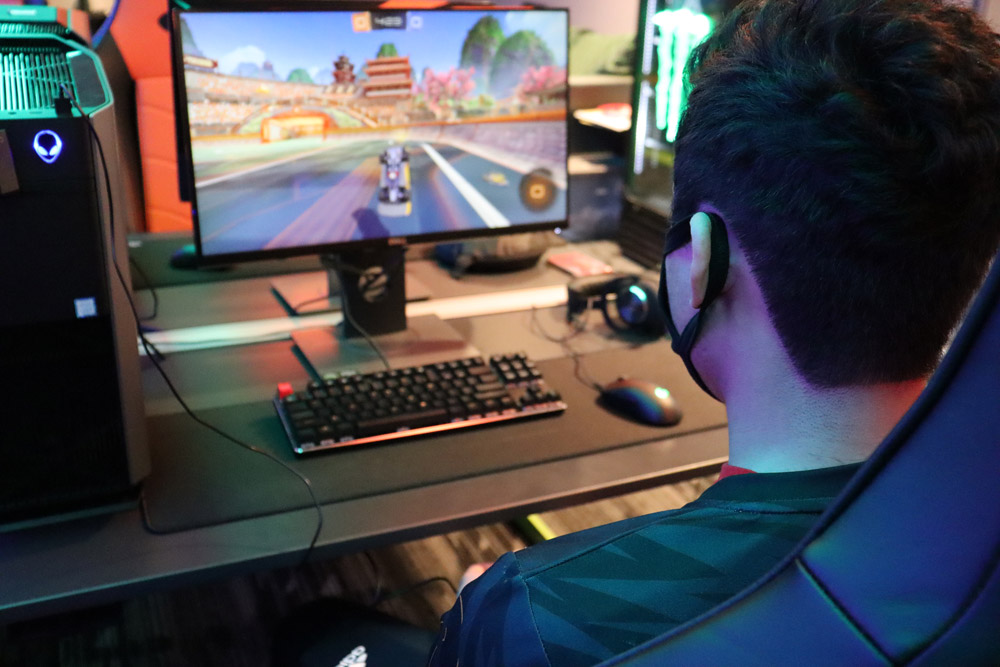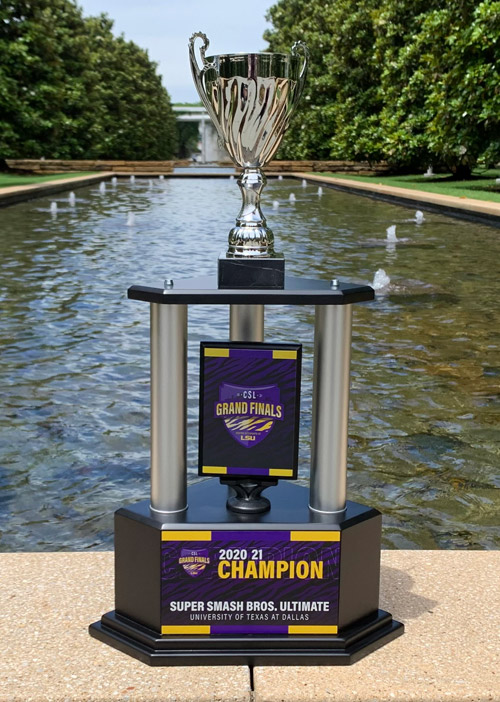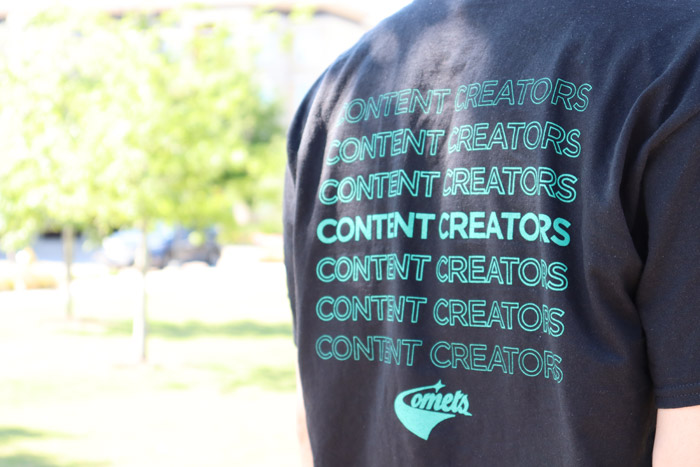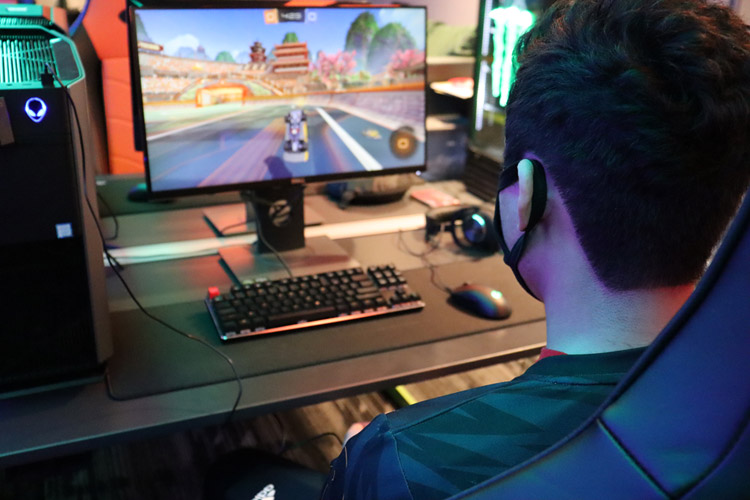
Although this year’s championship took place completely online, when the UT Dallas Super Smash Bros. Ultimate team won its second national title, the sense of victory was palpable.
Because of the COVID-19 pandemic, the University’s varsity athletics esports team spent its entire season meeting, practicing and competing online, rather than in person.
The Smash team’s yearlong circuit concluded in April with the Collegiate Starleague Smash Ultimate National Championships, where the Comets defeated Michigan State University in the grand finals.

2020-2021 National Championship Super Smash Bros. Ultimate Roster
- Zach Rendulic, ATEC
- Christopher Sweetman, computer science
- Keven Nguyen, mechanical engineering
- Marcel Hayek, computer science
- Gabriel Emile Hernandez, computer science
- Sean Fox, computer science
- Jackson McGinnis, biomedical engineering
- Devin Crabtrey, ATEC game design
- Garrett Olaes, ATEC
- Kenji Sherman, accounting
Learn more about the UT Dallas esports program and follow the Comets on Twitter, Twitch, YouTube and Instagram.
“Bringing home our second national championship in three years is pretty awesome,” said Greg Adler, UT Dallas head coach and director of esports. “It’s one of the reasons we added Smash to the UT Dallas esports program in the first place — the players have a lot of potential. We only have three people on the team who were there for the first championship. We just keep recruiting new players, and it keeps making us better and better.”
Christopher Sweetman, a computer science major, secured the final win for the Comets.
The esports teams communicate via Discord, a platform for connecting via voice calls, video calls and text messaging. During the championship game, Sweetman said, the atmosphere was energetic.
“Every time one of our teammates made a play, the call was explosive, and everyone was excited,” Sweetman said. “Toward the end of the match, I left the call to focus. But when I joined again as soon as it ended, it was just a lot of noise from sheer excitement. It lifted the tiredness that we felt from competing all day.”
Two years ago, the team traveled to Massachusetts to compete in the same tournament at Shine 2019 — one of the largest events in the world for Smash tournaments — and brought home the University’s first athletics national championship. The 2020 season was canceled due to the pandemic.
Unlike the makers of Overwatch, League of Legends and Rocket League, Nintendo does not host an official college tournament for Super Smash Bros. Ultimate.
“Winning our second national championship was definitely one of the biggest payoffs for me and the other players,” said Sweetman, a member of the 2019 championship team. “Competing virtually this year was a whole different ballgame for Smash Bros., especially since many of the plays that we used in the past would not work in the same way online.”
The Smash team also won the tournament hosted by the National Association of Collegiate Esports. The UT Dallas roster was divided into two teams, which ended up meeting in finals to battle for first and second place. The Comets competed against more than 50 other college teams.
Other Soaring Results
The UT Dallas Overwatch team had its best year yet, ending the season ranked in the top 8 in the country.
When competing for a spot in the top 4 at the Activision Blizzard Overwatch Collegiate Championship, the Comets lost to Harrisburg University of Science and Technology.
UT Dallas Esports Tryouts
Tryouts for the UT Dallas esports teams will be held this summer.
- Overwatch: July 12-16
- League of Legends: July 19-23
- Rocket League: July 26-30
- Super Smash Bros. Ultimate will be based solely on local and regional tournament results.
For more information, interested students may join the esports program’s Discord server.
This season, Adler decided to combine the Overwatch A and B teams for the first time.
“I think that helped,” he said. “We were able to pull all of our players onto one team, and everybody stepped up really big. They recognized we had a competitive team, and they knew that if they put the work in outside of practice, we would go far.”
The UT Dallas Rocket League team also advanced to the playoffs. In May, they finished in the top 6 at the Collegiate Rocket League Spring Championship.
“Rocket League had a pretty incredible year,” Adler said. “Our team went from not even qualifying in league play last year, to making it to the top 6 this year. We had two new freshmen that came in, and they helped a lot. They brought a ton of energy, and they’re super passionate.”
Although they won two tournaments in November and March, League of Legends did not make the playoffs this year.
Eyes on the Prize
Adler said the program is already preparing for next season. The players are looking forward to getting back into the Sector 7 Energy Esports Gaming Arena on campus and celebrating those big wins together.
“Soon, we’ll get back to our weekly, in-person tournaments. We’ll get to play the games the way they’re supposed to be played and get ready for an in-person season,” Adler said. “We’re going to have a target on our backs next year.”
Student-Led Initiatives Help Gamers Connect
UT Dallas esports has introduced two initiatives in an effort to help gamers and streamers in the University community connect.
The Content Creator Program, which teaches students how to create content, brand themselves and grow an audience, recently has grown to include more than 80 content creators.
“As an esports program, we do an awesome job competitively, but esports also allows you to get involved with the community,” UT Dallas esports head coach and director Greg Adler said. “A big thing in esports and the gaming world right now is streaming and creating content. We host meetings to help improve their streams, give them tips and direct them to resources. We’re trying to get as many students as possible involved and help them represent what they love through the program.”

The group includes Twitch streamers, YouTubers, TikTokers, vloggers and video editors.
“I started the program so that student creators would have a space to create and be empowered to be the best creators they can be,” said Kelsi Tresko, an arts, technology, and emerging communication (ATEC) major and student lead of Content Creators. “The goals are for the creators to collaborate with each other and build communities of their own.”
The group also annually raises money for St. Jude PLAY LIVE, a fundraising campaign that benefits St. Jude Children’s Research Hospital. They raised more than $2,500 throughout May.
A new Minecraft server initiative also is connecting Comets.
Olivia Johnson, student head of events for the esports program, said the idea of a Minecraft server created especially for the UT Dallas community began in December 2020, after the first full semester of remote classes.
“We believed it would be a good fit for UT Dallas because of the strong presence of gamers, both inside and outside the esports program,” she said. “We saw the creation of this server as a way to unify those two groups in one easily accessible setting. UTD is a home away from home for much of the student body; thus, we utilize the Minecraft server to create the same homey feeling for students, even when they’re away from campus.”
Johnson, a global business major, said groups of students are regularly playing online and interacting. Since its launch, about 180 gamers have joined.
With collaboration from across the University, including Radio UTD, the Galerstein Gender Center, and University Recreation, the team of volunteers who oversee the initiative hosted a virtual, in-game commencement ceremony for recent graduates in June.
